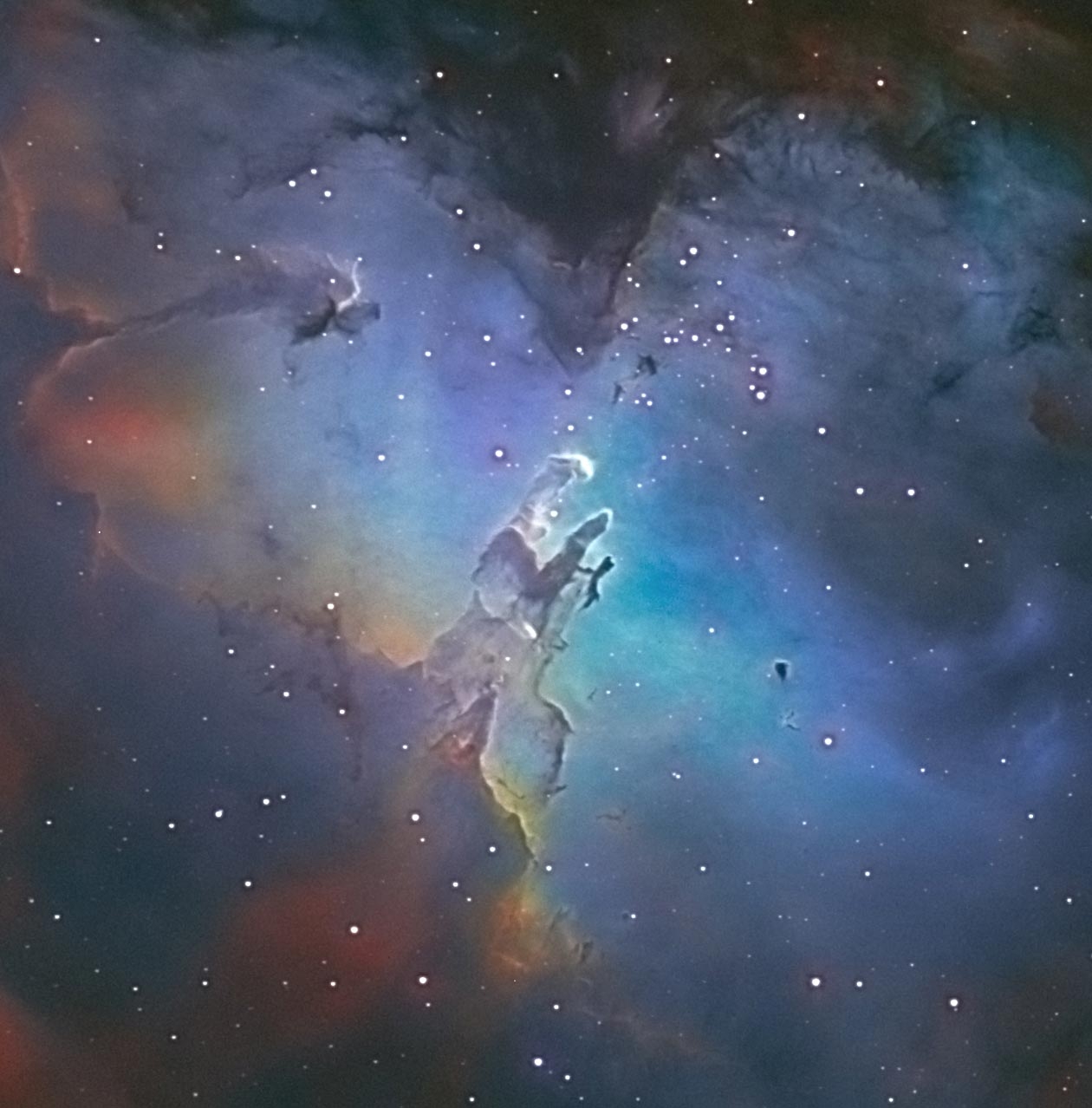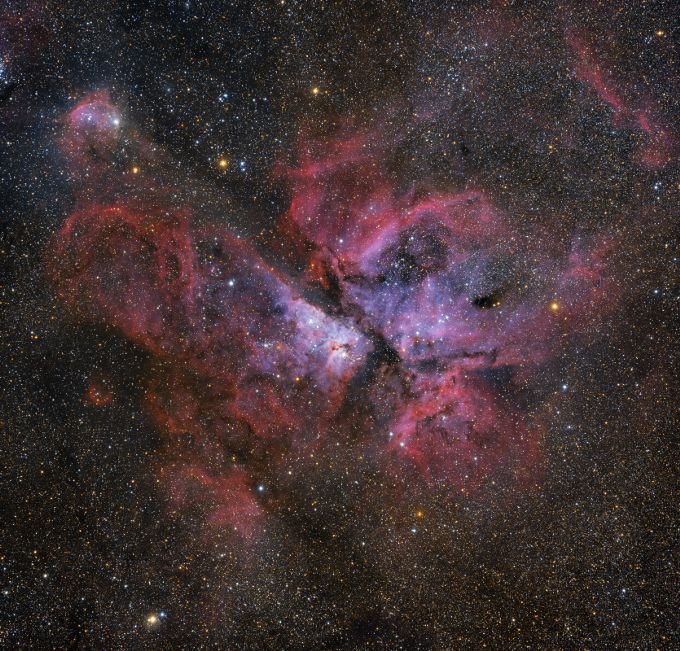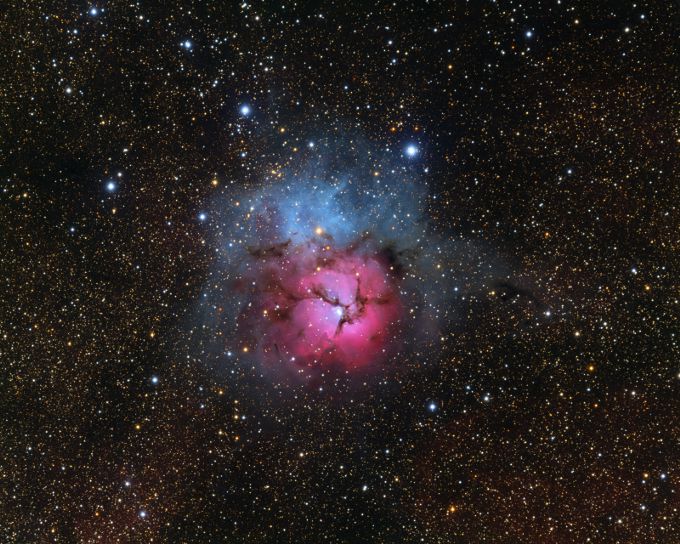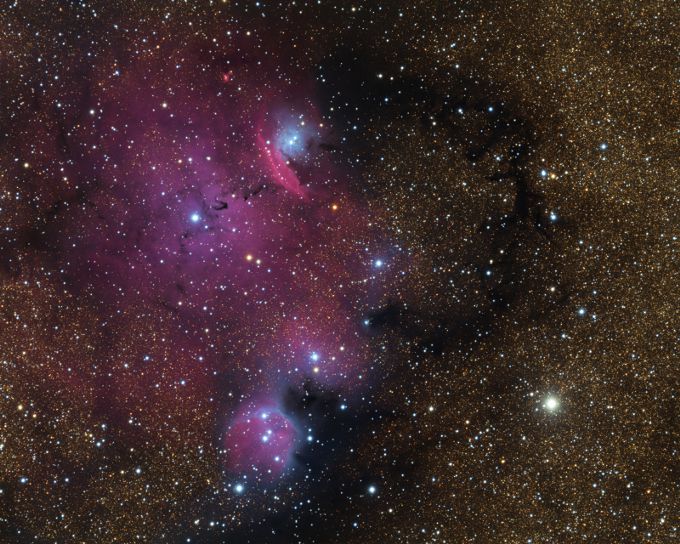Submissions: 2014 May
Re: Submissions: 2014 May
The Magnificent Neptunian System - Voyager 2 Data Revisited
http://www.rolfolsenastrophotography.com
Copyright: Rolf Wahl Olsen Link to large image
This image is made from data acquired during Voyager 2's closest approach to Neptune on August 25, 1989. Visible is the backlit planet viewed from Voyager 2 on its way out of the Solar System after the spacecraft had passed closest approach. The crescent shape of Neptune shows bright cirrus clouds and a dark band encircling the South Pole region, as well as a cyclonic structure at the pole itself, perhaps similar in nature to Saturn's now famous hexagon. Encircling the planet is the very faint ring system and the three bright ring arcs in the Adams ring; Liberté, Égalité and Fraternité, which were discovered by Voyager 2 during the fly-by.
To my knowledge a comprehensive high resolution image of the entire Neptunian system has never been released. However, image data for both the planet itself as well as the ring system and the largest moon Triton, taken within fairly short intervals from similar vantage points, do exist in NASA image archives.
To produce the image I scoured the Voyager 2 image data freely available from NASA's Planetary Data System. I was able to find raw images of a crescent Neptune showing intriguing cloud bands around the South Pole. No complete image of the ring system exist, but based on available long exposure images of portions of the rings I was able to create a model of the density profile. I then fitted this model around the crescent planet to get a complete view, in accordance with the viewing angle as seen in the raw Voyager 2 images. A raw image of the brighter ring arcs was then processed and overlaid on the rings in a position corresponding with the original image data.
Visible to the right of Neptune is the small crescent of its largest moon Triton. This part of the image is based on Voyager 2 data that shows Triton here in front of Neptune, but which was not taken until 3 days after the fly-by. I decided to include this data to achieve a more complete picture of the magnificent Neptunian system. Because the viewing angle of Neptune as seen from the spacecraft did not change significantly while it was receding out towards interstellar space, the entire scene would at this time have appeared very similar to what is depicted here. Only the positions of the clouds and ring arcs would have changed since the closer image of the Neptune crescent was taken.
In order to include the background star field I plate solved one of the raw long exposure images of the rings which showed some stars. The successful plate solving revealed that the background was centered around RA 06h 09m 52.213s Dec +67° 31' 20.258" in Camelopardalis. I then downloaded corresponding DSS image data from Google Sky and inserted it as a background, sufficiently toned down so as to not interfere too much with the grandeur of Neptune while still providing a realistic context. The field of view as seen from Voyager 2 is approximately 5.5° x 7.5°.
Image Assembly & Processing: Rolf Wahl Olsen
Image Data: NASA/JPL (Voyager 2, NASA Planetary Data System)
For more information about the Voyager spacecraft, visit: http://www.nasa.gov/voyager
http://www.rolfolsenastrophotography.com
Copyright: Rolf Wahl Olsen Link to large image
This image is made from data acquired during Voyager 2's closest approach to Neptune on August 25, 1989. Visible is the backlit planet viewed from Voyager 2 on its way out of the Solar System after the spacecraft had passed closest approach. The crescent shape of Neptune shows bright cirrus clouds and a dark band encircling the South Pole region, as well as a cyclonic structure at the pole itself, perhaps similar in nature to Saturn's now famous hexagon. Encircling the planet is the very faint ring system and the three bright ring arcs in the Adams ring; Liberté, Égalité and Fraternité, which were discovered by Voyager 2 during the fly-by.
To my knowledge a comprehensive high resolution image of the entire Neptunian system has never been released. However, image data for both the planet itself as well as the ring system and the largest moon Triton, taken within fairly short intervals from similar vantage points, do exist in NASA image archives.
To produce the image I scoured the Voyager 2 image data freely available from NASA's Planetary Data System. I was able to find raw images of a crescent Neptune showing intriguing cloud bands around the South Pole. No complete image of the ring system exist, but based on available long exposure images of portions of the rings I was able to create a model of the density profile. I then fitted this model around the crescent planet to get a complete view, in accordance with the viewing angle as seen in the raw Voyager 2 images. A raw image of the brighter ring arcs was then processed and overlaid on the rings in a position corresponding with the original image data.
Visible to the right of Neptune is the small crescent of its largest moon Triton. This part of the image is based on Voyager 2 data that shows Triton here in front of Neptune, but which was not taken until 3 days after the fly-by. I decided to include this data to achieve a more complete picture of the magnificent Neptunian system. Because the viewing angle of Neptune as seen from the spacecraft did not change significantly while it was receding out towards interstellar space, the entire scene would at this time have appeared very similar to what is depicted here. Only the positions of the clouds and ring arcs would have changed since the closer image of the Neptune crescent was taken.
In order to include the background star field I plate solved one of the raw long exposure images of the rings which showed some stars. The successful plate solving revealed that the background was centered around RA 06h 09m 52.213s Dec +67° 31' 20.258" in Camelopardalis. I then downloaded corresponding DSS image data from Google Sky and inserted it as a background, sufficiently toned down so as to not interfere too much with the grandeur of Neptune while still providing a realistic context. The field of view as seen from Voyager 2 is approximately 5.5° x 7.5°.
Image Assembly & Processing: Rolf Wahl Olsen
Image Data: NASA/JPL (Voyager 2, NASA Planetary Data System)
For more information about the Voyager spacecraft, visit: http://www.nasa.gov/voyager
Re: Submissions: 2014 May
Love your work. Superb!SkyViking wrote:The Magnificent Neptunian System - Voyager 2 Data Revisited
http://www.rolfolsenastrophotography.com
Copyright: Rolf Wahl Olsen
Re: Submissions: 2014 May
Nitpicker wrote:Love your work. Superb!SkyViking wrote:The Magnificent Neptunian System - Voyager 2 Data Revisited
http://www.rolfolsenastrophotography.com
Copyright: Rolf Wahl Olsen
Thanks very much, I really appreciate it!Ann wrote:I agree. That is fantastic!
Ann
Re: Submissions: 2014 May
Title: Moon Halos
Copyright: Dario Giannobile
Website: http://www.dariogiannobile.com
Higher Res.: http://www.dariogiannobile.com/img/s5/v ... 1065-5.jpg
Clouds can be enemy for astrophotographers but sometimes they help us to create original works. In this case, during a single hour, the Moon and the clouds painted many halos in the sky with different colors and shapes.
douple exposure 0,4 sec for the moon halos and 1/125 sec the moon itself.
Dario Giannobile
Copyright: Dario Giannobile
Website: http://www.dariogiannobile.com
Higher Res.: http://www.dariogiannobile.com/img/s5/v ... 1065-5.jpg
Clouds can be enemy for astrophotographers but sometimes they help us to create original works. In this case, during a single hour, the Moon and the clouds painted many halos in the sky with different colors and shapes.
douple exposure 0,4 sec for the moon halos and 1/125 sec the moon itself.
Dario Giannobile
Re: Submissions: 2014 May
M51 Whirlpool Galaxy
http://www.astrobin.com/95121/B/
Copyright: Andrea Pistocchini
http://cdn.astrobin.com/images/thumbs/b ... ermark.jpg
http://www.astrobin.com/95121/B/
Copyright: Andrea Pistocchini
http://cdn.astrobin.com/images/thumbs/b ... ermark.jpg
Last edited by owlice on Sat Jun 07, 2014 1:32 pm, edited 1 time in total.
Reason: Removed img tags; please do not hotlink images over 400K
Reason: Removed img tags; please do not hotlink images over 400K
-
astrosirius
- Science Officer
- Posts: 117
- Joined: Fri Nov 23, 2012 11:17 am
- Location: Barcelona Spain
- Contact:
Re: Submissions: 2014 May
NGC 7000 The North America Nebula
Copyright: Luis Romero
Place: Ager-Lleida-Spain (Astrosirius observatory)
Date: 27-04-2014
Mount: Losmandy G11 with Gemini II
Telescope: Takahashi Epsilon 180 ED f/2.8
Camera: Canon 5D Mark II mod.
Telescope guide: Mini telescope Orion 50 df:165mm
CCD guiding: QHY5M
Filters: Astronomik CLS-CCD
Exposures: 23 x 300 sec at ISO 800.
Software: APT 1.5 & Pixinsight 1.8
Best Regards
Luis Romero.
http://www.astrosirius.org/
Copyright: Luis Romero
Place: Ager-Lleida-Spain (Astrosirius observatory)
Date: 27-04-2014
Mount: Losmandy G11 with Gemini II
Telescope: Takahashi Epsilon 180 ED f/2.8
Camera: Canon 5D Mark II mod.
Telescope guide: Mini telescope Orion 50 df:165mm
CCD guiding: QHY5M
Filters: Astronomik CLS-CCD
Exposures: 23 x 300 sec at ISO 800.
Software: APT 1.5 & Pixinsight 1.8
Best Regards
Luis Romero.
http://www.astrosirius.org/
Lluís Romero Ventura
http://astrotolva.com/
http://astrotolva.com/
-
IvoT
Re: Submissions: 2014 May
Messier 13
Copyright: Ivo Tschager

http://www.sterntor.net/files/gross/m13morovianrgb.jpg
http://www.sterntor.net/
Copyright: Ivo Tschager

http://www.sterntor.net/files/gross/m13morovianrgb.jpg
http://www.sterntor.net/
-
IvoT
Re: Submissions: 2014 May
IvoT wrote:Messier 13
Copyright: Ivo Tschager
http://www.sterntor.net/files/m13q.jpg
http://www.sterntor.net/
Re: Submissions: 2014 May
When Panstarrs greeted M51
http://hardcity.perso.sfr.fr/hardcity/N ... venue.html
Copyright: Philippe DURVILLE
Larger image : http://hardcity.perso.sfr.fr/hardcity/a ... rdcity.jpg Thanks for looking!
http://hardcity.perso.sfr.fr/hardcity/N ... venue.html
Copyright: Philippe DURVILLE
Larger image : http://hardcity.perso.sfr.fr/hardcity/a ... rdcity.jpg Thanks for looking!
-
StefanoDeRosa
- Science Officer
- Posts: 114
- Joined: Mon Apr 12, 2010 8:37 am
Re: Submissions: 2014 May
Full Moon and Monviso peak
http://stefanoderosa.com/
Copyright: Stefano De Rosa Please find above an image taken on May 15, 2014, showing Full Moon as sets alongside the Monviso peak (3,843 meters high). In the foreground is the church of Borgo Cornalese, few km away from Turin.
Best regards
Stefano
http://stefanoderosa.com/
Copyright: Stefano De Rosa Please find above an image taken on May 15, 2014, showing Full Moon as sets alongside the Monviso peak (3,843 meters high). In the foreground is the church of Borgo Cornalese, few km away from Turin.
Best regards
Stefano
Re: Submissions: 2014 May

The pattern is full. From Farpoint View at Bryce Canyon the flightpath is full. 3 planes low on the horizon are outnumbered by the 4 Eta Aquarid meteors above Bryce Canyon.
On a bitterly cold evening in May the temperature hovered at 21 degrees and a 30 mph wind whipped through the night. Hard to believe the Summer Triangle sparkled overhead in the bone chilling cold, but there it was. A panorama of 12 images captured an otherworldly Bryce Canyon vista with the Milky Way blazing overhead.
Larger image at:
http://re-prop.com/apod/Bryce-2-Final.jpg
Re: Submissions: 2014 May
This is a lovely image!hardcity wrote:When Panstarrs greeted M51
http://hardcity.perso.sfr.fr/hardcity/N ... venue.html
Copyright: Philippe DURVILLE
Larger image : http://hardcity.perso.sfr.fr/hardcity/a ... rdcity.jpg Thanks for looking!
Note the long, faint ion tail of the comet, which points straight away from the Sun. The short but much brighter dust tail points in a direction which is a "compromise" between the solar wind and the comet's own motion.
Note the amazing colors, too. The comet is very green. M51, the Whirlpool galaxy, is bluish. NGC 5195, the smaller galaxy that M51 is interacting with, is yellowish. Two relatively bright stars, 21 CVn and 24 CVn, look strikingly blue by comparison. Both are of spectral class A, and 21 CVn (very near the comet) actually has a negative (truly blue) color index. 21 CVn also has a small orangish and a small greenish companion.
Finally, note how the galaxy pair forms a perfect triangle with CVn 21 and CVn 24. It is so perfect, indeed, that you could almost use it to demonstrate what a right triangle is! Note how the comet fits perfectly into that triangle, and its long ion tail almost forms the hypotenuse of the triangle!
Ann
Color Commentator
Re: Submissions: 2014 May
Re: Submissions: 2014 May
Jewelry in the Southern Hemisphere
Copyrights: Sergio Emilio Montúfar Codoñer Window to Heaven
Copyrights: Victor Gabriel Bibé Milky Way over Cazorla
Copyrights: Jose Jimenez The Magnificent Neptunian System
Credits: NASA's Planetary Data System \ Rolf Olsen Waxing Gibbous Moon on 05-10-2014
Copyrights: John Chumack IC 1848 - The Soul Nebula
Copyrights: Oliver Czernetz The monastery, the moon halo and the iridium flare
Copyrights: J.J. Losada
Copyrights: Sergio Emilio Montúfar Codoñer Window to Heaven
Copyrights: Victor Gabriel Bibé Milky Way over Cazorla
Copyrights: Jose Jimenez The Magnificent Neptunian System
Credits: NASA's Planetary Data System \ Rolf Olsen Waxing Gibbous Moon on 05-10-2014
Copyrights: John Chumack IC 1848 - The Soul Nebula
Copyrights: Oliver Czernetz The monastery, the moon halo and the iridium flare
Copyrights: J.J. Losada
Re: Submissions: 2014 May
Jellyfish Nebula
Copyrights: John Vermette Mars on May 9th - The Mars volcanic region
Copyrights: Carmelo Zannelli ISS passing over the Subaru Telescope atop Mauna Kea
Copyrights: Hideaki Fujiwara Clear Skies over Beijing, with belt of Venus
Copyrights: Victor van Wulfen Arcturus, Mars, & Saturn Triangle around the Moon & Spica
Copyrights: John Chumack Full Moon
Copyrights: Mohamed Laaifat M51 and Panstarrs
Copyrights: Philippe Durville
Copyrights: John Vermette Mars on May 9th - The Mars volcanic region
Copyrights: Carmelo Zannelli ISS passing over the Subaru Telescope atop Mauna Kea
Copyrights: Hideaki Fujiwara Clear Skies over Beijing, with belt of Venus
Copyrights: Victor van Wulfen Arcturus, Mars, & Saturn Triangle around the Moon & Spica
Copyrights: John Chumack Full Moon
Copyrights: Mohamed Laaifat M51 and Panstarrs
Copyrights: Philippe Durville
- marion165
- Science Officer
- Posts: 117
- Joined: Fri Oct 21, 2011 6:27 pm
- Location: Lancaster, PA USA
- Contact:
Re: Submissions: 2014 May
Star Trails from the Shaky Bridge
https://www.flickr.com/photos/radicalre ... 006163529/
Copyright: Marion Haligowski
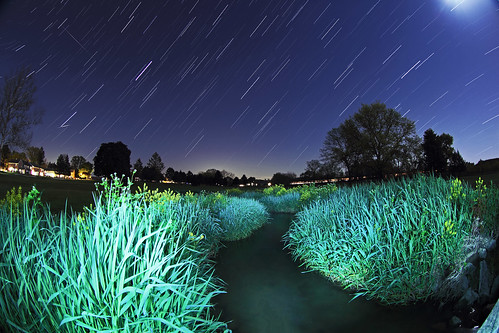
Star Trails from the Shaky Bridge by Radical Retinoscopy, on Flickr
Eighty-eight 20 second exposures were combined in StarStaX of the Landis Run stream as imaged from a wooden foot bridge. A meteor can be seen in the left side of the photograph below the rising constellation Lyra. The photo was made using a Canon T2i and a Canon 8-15L zoom lens at 9mm (ISO 400; f/4.5)
https://www.flickr.com/photos/radicalre ... 006163529/
Copyright: Marion Haligowski

Star Trails from the Shaky Bridge by Radical Retinoscopy, on Flickr
Eighty-eight 20 second exposures were combined in StarStaX of the Landis Run stream as imaged from a wooden foot bridge. A meteor can be seen in the left side of the photograph below the rising constellation Lyra. The photo was made using a Canon T2i and a Canon 8-15L zoom lens at 9mm (ISO 400; f/4.5)
- geckzilla
- Ocular Digitator
- Posts: 9180
- Joined: Wed Sep 12, 2007 12:42 pm
- Location: Modesto, CA
- Contact:
Re: Submissions: 2014 May
Still finding treasures. This is a new combination of data in order to form a more complete look at the bright central area of the Lagoon Nebula. The left side uses data acquired in 2009 under proposal 11981 and the right side from 1995 under proposal 6227. This image is comprised of wideband infrared (f814w), narrowband H-alpha (f656n) and H-beta (f487n), and Strömgren y (f547m) data. An uncropped, losslessly compressed, north-up version is here.
Lagoon Cocoon
Image Credit: Hubble Legacy Archive, NASA, ESA; Processing: Judy Schmidt
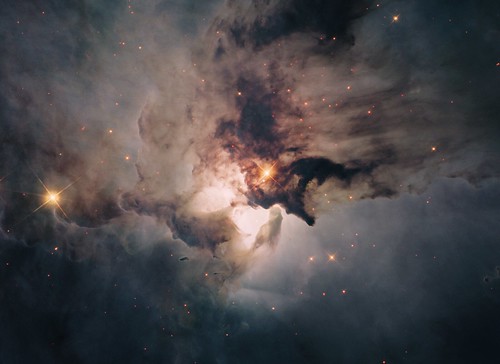
Lagoon Cocoon
Image Credit: Hubble Legacy Archive, NASA, ESA; Processing: Judy Schmidt

Just call me "geck" because "zilla" is like a last name.
Re: Submissions: 2014 May
Some old data reprocessed
Ha+RGB total integration time 14.8 hours. Link to full size image
https://www.flickr.com/photos/andyinsea ... 1/sizes/o/
Ha+RGB total integration time 14.8 hours. Link to full size image
https://www.flickr.com/photos/andyinsea ... 1/sizes/o/
Re: Submissions: 2014 May
NGC3372
Copyright: Wolfgang Promper http://www.astro-pics.com/3372npm.htm
Copyright: Wolfgang Promper http://www.astro-pics.com/3372npm.htm
Re: Submissions: 2014 May
NGC6559
Copyright: Wolfgang Promper http://www.astro-pics.com/6559npm.htm
Copyright: Wolfgang Promper http://www.astro-pics.com/6559npm.htm
-
thewildlifemoments
- Ensign
- Posts: 18
- Joined: Fri Jun 28, 2013 10:27 am
Re: Submissions: 2014 May
Panoramic view of the milky way arch in Cala Cipolla,Sardinia (Italy).
milky way castle
copyright: Ivan Pedretti
http://www.thewildlifemoments.com
milky way castle
copyright: Ivan Pedretti
http://www.thewildlifemoments.com
- mexhunter
- Science Officer
- Posts: 467
- Joined: Tue Apr 27, 2010 1:41 pm
- AKA: César Cantú
- Location: Monterrey, Mexico.
- Contact:
Re: Submissions: 2014 May
Sadr or Gamma Cygni is a yellow giant star, about 65,000 times brighter than our Sun.
Visually it's located in a complex region of the Milky Way, Sadr is surrounded by diffuse emission nebula IC 1318, illuminated by hot young stars. However, Sadr is not part of the nebula, as it is halfway between it and the Earth, being a foreground star. The open cluster NGC 6910, in the same visual field, is also much more distant.
For this image I was used a Takahashi 180ED Epsilon Telescope and FLI 8300 camera, both on an Orion Atlas EQ mount.
Copyright: César Cantú
Visually it's located in a complex region of the Milky Way, Sadr is surrounded by diffuse emission nebula IC 1318, illuminated by hot young stars. However, Sadr is not part of the nebula, as it is halfway between it and the Earth, being a foreground star. The open cluster NGC 6910, in the same visual field, is also much more distant.
For this image I was used a Takahashi 180ED Epsilon Telescope and FLI 8300 camera, both on an Orion Atlas EQ mount.
Copyright: César Cantú
I come to learn and to have fun.
